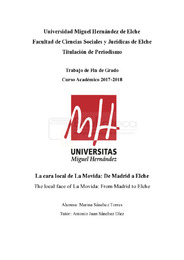Resumen :
A finales de los años setenta y principios de la década de los ochenta, del siglo pasado,
se desarrolló en España un movimiento cultural que se convertiría en uno de los
periodos de mayor calado en la sociedad española, el conocido como La Movida;
término acuñado por el periodista Francisco Umbral, aunque sus propios protagonistas
prefieren sustituirlo por el originario Nueva Ola.
Miguel Trillo, importante fotógrafo de la corriente artística ochentera, recientemente
valoró la importancia del fenómeno cultural en una charla celebrada en las salas Odeón
de Elche: “La Guerra Civil y La Movida son los dos únicos acontecimientos conocidos
fuera de España”.
El presente Trabajo de Fin de Grado analiza la relevancia del movimiento cultural que
reconstruyó la sociedad española en los ochenta, haciendo especial hincapié en la
influencia que La Movida madrileña ejerció en Elche. Así pues, el objetivo es conocer y
explorar la repercusión que tuvo para el municipio ilicitano el desarrollo de un
fenómeno de tal calibre, a través del análisis de la prensa local de la época y de
entrevistas a personajes que conocen de cerca el movimiento socio-cultural.
El estudio incluye un análisis cuantitativo de las publicaciones relacionadas con La
Movida durante 1983, pertenecientes a las ediciones locales de los periódicos La Verdad
e Información. Asimismo, la investigación se ha apoyado en los libros consultados y en
las entrevistas realizadas a relevantes personalidades relacionadas con dicho tema, como
Beatriz Alonso Aranzábal (teclista de Los Monaguillosh y productora del documental
De un tiempo libre a esta parte), Paco Valverde (cantante de La Oscura Posibilidad) y
Julián Sáez (comunicador ilicitano en La Movida).
Finalmente, los resultados obtenidos permiten apreciar la existencia de un fenómeno
que alcanzó a todo un país, demostrando que no se trata de una corriente artística
únicamente madrileña, sino también desarrollada a nivel local.
At the end of the seventies and the beginning of the eighties, a cultural movement was
developed in Spain that would later become one of the periods of greatest importance in
the Spanish society, generally known as La Movida. It is a term coined by the journalist
Francisco Umbral, although most of its own supporters prefer to call it Nueva Ola.
Miguel Trillo, an important photographer of the eighties’ art movement, assessed the
importance of the cultural phenomenon during a talk held in the Odeón halls of Elche:
“The Spanish Civil War and La Movida are the only two well-known events outside
Spain”.
This final project analyses and investigates the relevance of the cultural movement that
reconstructed the Spanish society in the eighties. Specifically, it focuses on the
influence that La Movida from Madrid exercised in the city of Elche. Thus, our
objective is to investigate the repercussion that the development of this phenomenon
had for Elche. To study this, we will analyse the local press of the time and we will
interview some important people that know about this movement.
The study includes a quantitative analysis of the publications related to La Movida
during 1983, which belong to the local newspapers La Verdad and Información.
Furthermore, the research was based on different books that we consulted and some
interviews with relevant people associated with this topic, such as Beatriz Alonso
Aranzábal (keyboardist of the band Los Monaguillosh and the producer of a
documentary called De un tiempo libre a esta parte), Paco Valverde (a singer of La
Oscura Posibilidad) and Julián Sáez (a journalist from Elche when La Movida took
place).
The results that we obtained allow us to appreciate the existence of a phenomenon in
which a whole country was immersed; therefore, we can prove that La Movida isn’t just
an artistic trend from Madrid, but also a movement developed in other places such as
Elche.
|
 La licencia se describe como: Atribución-NonComercial-NoDerivada 4.0 Internacional.
La licencia se describe como: Atribución-NonComercial-NoDerivada 4.0 Internacional.
.png)
